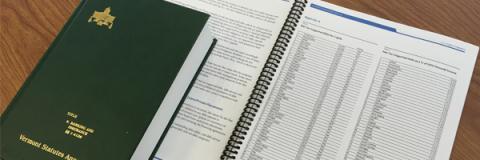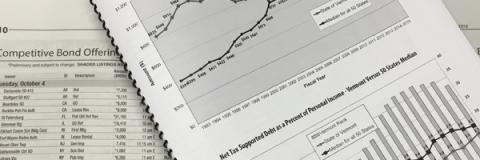MONTPELIER, VT.— Following recent federally declared disaster declarations due to record-breaking rainfall in May, Gov. Peter Shumlin and State Treasurer Beth Pearce today announced that towns located within FEMA designated areas will be eligible for accelerated payments of State funds. This early payment program mirrors one implemented in 2011 to assist towns hard-hit by Tropical Storm Irene.
“Once again, Vermont towns are responding to extraordinary weather events that have caused damage and destruction to roads, bridges and other infrastructure,” the Governor said. “By placing key State payments on the fast-track, we hope to ease the burden on municipalities with any cash flow issues these storms created.”
Payments that are eligible to be released early are:
• State aid to town highways, disbursed quarterly, with upcoming payments scheduled for October, January and April;
• Payment-in-lieu-of taxes, normally dispersed to towns in October;
• Current use payments, typically disbursed in November;
• State aid to education payments, normally released in December and April; and
• Payment-in-lieu-of taxes for Agency of Natural Resources land, annually disbursed in November.
FEMA announced on June 13 that federal disaster aid will be available to Vermont to supplement state and local recovery efforts in areas affected by severe storms and flooding that occurred May 22-26, 2013. Federal funds are available on a cost-sharing basis for emergency work and the repair or replacement of facilities damaged in Chittenden, Essex and Lamoille counties. Damage estimates from these storms is approximately $1.5 million.
“By accelerating payments to towns, we hope to mitigate the financial impacts of costly repairs,” said Treasurer Pearce. “Many projects can’t wait until federal funds are in-hand, but must be addressed immediately. Receiving expedited funds from the State can be a big help by providing towns with the cash needed now and help reduce any costs that could be incurred if municipalities must borrow money to cover expenses.”
"This is a particularly difficult time of year for Vermont municipal governments' cash flow,” said Steven Jeffrey, Executive Director of the Vermont League of Cities and Towns. “Their fiscal year has just ended and property tax bills are just now being mailed out and won't be due in many cases for months. Add to that their outstanding loans to pay for Irene, other previous weather event repairs, and now these monumental damages to fix and the hardest hit towns are cash-strapped. This early influx of State assistance will be greatly appreciated and will help tide the towns over until tax revenues and any FEMA assistance becomes available."
The National Weather Service reported that several locations across Chittenden and Lamoille countries experienced six-day rainfall totals of more than 6 inches from May 22-26. Flash floods temporarily closed more than two dozen roads in both counties as culverts were washed out and significant erosion occurred. A second heavy rainfall during this period also produced considerable flash flooding in the areas of Essex, Jericho, Underhill and Jeffersonville.
Preliminary Damage Assessment teams from FEMA also are currently evaluating recent storm damage that occurred more recently in Chittenden, Orange, Orleans, Rutland, Washington and Windsor counties. Storm damage totals from these counties could total more than $4 million.
To be eligible for accelerated State payments, towns must request it and document the amount of repairs anticipated from the recent FEMA declared disaster designations.
“The State is able to offer this assistance due to prudent fiscal management that has placed us in a strong cash position,” said Pearce.
It is estimated that the amount of accelerated payments could total more than $1 million for towns applying from May’s FEMA disaster declared areas. Should additional Vermont counties receive disaster declarations, the State also will consider requests for accelerated payments from towns in the declared counties.
The State Treasurer’s Office will notify municipalities in the coming weeks about the opportunity to apply for accelerated payments.
The National Weather Service reported that May and June have been the wettest two-month consecutive stretch ever recorded at their Burlington station, with a record 18.6 inches of rain. The weather service reports 8.74 inches fell in May and 9.86 inches fell in June.
-end-





